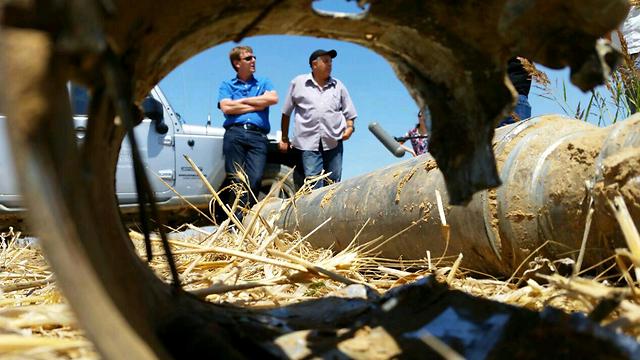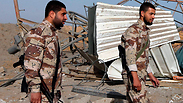Rounds of escalation in the Gaza Strip, like derby matches in soccer, have their own rules. Rules that the main players dare not and do not break, as everyone knows that it would end in tears. One example of such an outcome would be another IDF operation in the Gaza Strip, which would leave in its wake a trail of destruction, casualties and psychological trauma on both sides.
Hamas' political leadership does not want such an escalation now, as a deterioration of this kind would threaten the survival of its rule in Gaza, and cause untold suffering to the more than 1.5 million Palestinians living in the Strip.
Even Hamas' military wing is presently seeking calm, so it can complete its buildup and preparations for the next confrontation. The other major Palestinian organizations operating in Gaza are also interested in calm - for the same reasons; the Palestinian Authority, Egypt, Arab world and the international community – all want Gaza to remain calm and be rebuilt, so that it can fall off their radar.

There's no need to explain why Israel wants calm, and to what extent. In fact only the rogue elements in Gaza are seeking to rekindle the fire. The Salafists, a jihadist group working on Islamic State instructions, militants among the Palestinian Islamic Jihad and others interested in the dynamics of an escalation - whose brutal climax is well-known to all the players.
Sometimes this small group will take the law into their own hands so that the IDF will punish their opponents. A week ago, it was members of the Palestinian Islamic Jihad, who fired a rocket because they were appointed a regional commander not to their liking; on Wednesday, it was Salafists loyal to Islamic State after Hamas killed one of their activists and tried to bring them in line. This kind of behavior will last for as long as Gaza, with its unemployment rate of more than 44%, has a paralyzed economy and young and old alike sit idle between the waves of destruction.
So now, because of another stupid dispute between the hotheads in Gaza, there is another volley of Grads hitting the Negev. Hamas informs Israel that it wasn’t them, and bans such rocket launches, while the IDF retaliates with a restrained attack on "three terrorist targets" that have no military value and lead to no deterrence.
Why? The Israeli government does not want the truce to break down, but it cannot accept a situation in which more than one million Israelis forced - always in the evening – into their protected spaces. They lose not only their physical security, but also the sense of security that allows them to send their children to school in the mornings.
The most frustrating and serious aspect of this situation is that we are all pawns in the hands of a small group of bored extremists, who are pushing us down that slippery slope to war. And when we do have the next big battle in Gaza, and even topple Hamas, as some politicians want, what then? Or when the IDF takes up positions in Gaza, suffering losses every month without being able to completely halt the drizzle of rockets? Or when the IDF pulls out of Gaza again, leaving behind such a chaos of radical Islamists that it would make us miss Hamas?
This is not writ in the stars. It is possible to break the cycle - restoring Gaza from the ruins and restarting of its economy would work wonders. This is just what happened in the West Bank after the second intifada.
True, the IDF and Shin Bet are not operating inside the Gaza Strip every night to "mow" the sprouts of terrorism as it has in the West Bank, nor is there any security cooperation between Israel and Hamas, as there is with Mahmoud Abbas' security forces. But Hamas reigns sovereign in Gaza, and if sufficiently motivated can maintain order and suppress the "rogues".
Hamas has the manpower and means to do it. The problem is that it is not yet sufficiently in Hamas's interest to act decisively to maintain the calm. The money for rehabilitating Gaza - the five billion dollars promised at last summer's donors' conference - has not arrived. This is partly because the situation in Gaza is unstable and partly because there is no written cease-fire agreement between the two sides to ensure that any rehabilitation projects are not destroyed in the next round of fighting. Meanwhile, Egypt has shut its crossings into Gaza and will not reopen them unless Abbas' Palestinian Authority takes responsibility for them, thereby ensuring that there is no trickle of terrorism from Gaza to Sinai.
But Abbas is not ready to send his men to seize control of the Rafah crossing and ones into Israel, because he is scared of Hamas, and not ready to surrender to the terms that organization would try to dictate. Only Israel - yes, only Israel with the help of the United Nations - is doing everything in its power to kick start the reconstruction of Gaza and its economy. But without the money, nothing can move, and the money won’t arrive until the political situation is stabilized.
So what's the missing ingredient? There's no mediator to jump start the process of drafting a truce and recovery agreement. Currently there are talks about trade at the crossings, but there is no political dialogue between Hamas and Israel. This is not because Israel has no interest in this, but because Hamas is not willing to talk with Israel. Hence the need for a mediator.
The Egyptians have already taken sides, and consider Hamas a major enemy; the Europeans are unwilling to dive in after they were burned in the past, and even the Americans have given up; Turkey is not considered by Israel to be an honest broke and neither is Qatar. Israel welcomes the funds entering Gaza from these two sources, but is unwilling to give them the authority to draft any arrangement that will or will not arise with Hamas.
So who is left? Saudi Arabia. Israel and Hamas both view it as an honest broker that can be trusted. But the new Saudi king is already up to eyes with Iran, supporting the rebels in Syria, fighting the Houthis in Yemen and tackling Islamic State. The last thing he needs is to become mired in Gaza as well.
So in the meantime, Israel and Hamas remain pawns in the hands of the hotheads who will do everything in their power to ensure that yet another summer does not pass without a horrific little war.


















